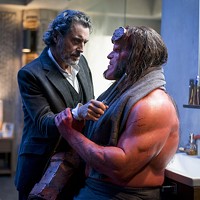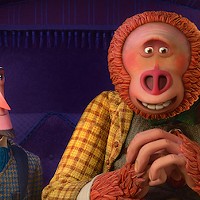

Page 3 of 8
IN TIME Can a movie survive on premise alone? That would be a resounding no, since its success also rests squarely on the shoulders of the execution. Yet in the case of In Time, the premise is ingenious enough to cut some slack elsewhere. The movie may not probe as deeply into its subject as desired, but it's nevertheless an enjoyable watch, full of propulsive action and intriguing scenarios. Comparisons to Logan's Run are absurd, since this picture sports its own ideas on what the future might hold. It's a world order in which everyone is genetically designed to live until 25 years of age, at which point they're given one extra year to keep for themselves or use as currency. Because in this story, time literally is money, as a cup of coffee costs four minutes, a bus ride costs two hours, and so on. The rich have the means to acquire hundreds of years to tack onto their lives, while the poor barely have enough time to struggle from day to day. In Time focuses on one of the 99%: Will Salas (Justin Timberlake), whose life is turned upside down after a disillusioned millionaire (Matt Bomer) transfers a full century to him. Amanda Seyfried co-stars as the rich kid who joins Will on the lam, Cillian Murphy plays the Timekeeper (aka lawman) who's in hot pursuit, and writer-director Andrew Niccol (Gattaca) is the one who deserves credit for crafting this heady mix of science fiction and social commentary. ***
JACK AND JILL Less than 48 hours before I embarked on the courageous journey to attend the screening of Jack and Jill, a co-worker offered his theory that Adam Sandler deliberately makes movies out of the stupidest ideas he can conjure, simply to prove that his fans will see him in anything. I stated that the comedian's next film will be Diarrhea Man, about a guy who spends his entire life sitting on a toilet making flatulent sounds, and the fact that my colleague couldn't tell whether I was joking or not says everything anyone needs to know about the cesspool of cinema known as the Adam Sandler Oeuvre. Jack and Jill certainly ranks near the very bottom; it's stupid and infantile, of course, but it's also lazy and contemptuous, a clear sign that Sandler and director Dennis Dugan (his seventh Sandler film; stop him before he kills again!) aren't even trying anymore, safe in the knowledge that audiences will emulate Divine in John Waters' Pink Flamingos and chow down on whatever dog shit is presented to him. Here, the stench is particularly potent, as this story about an obnoxious ad man (Sandler) and his whiny, overbearing sister (Sandler in drag) is a nonstop parade of scatological bits, prominent product placements, faux-hip cameos (Johnny Depp, welcome to the halls of whoredom), wink-wink chauvinism, racism and xenophobia, icky incest gags, annoying voices (not just Sandler as Jill but also the made-up language spoken by the siblings), and the usual small roles for Sandler's beer buddies (including, groan, David Spade in drag). Al Pacino co-stars as himself, inexplicably smitten with Jill; he provides the film's only two or three chuckles (especially a line about the Oscars), but even long before the sequence in which he raps about doughnuts, it's clear that he's become an ever bigger sellout than Robert De Niro. Now that's saying something. *
J. EDGAR As J. Edgar Hoover, the controversial Federal Bureau of Investigation director and one of the most powerful figures of the 20th century, Leonardo DiCaprio's performance is interesting, respectable, measured, unfussy and just a touch dry, qualities he shares with the ambitious picture surrounding him. It's always hard to encapsulate an entire life in one running time, but director Clint Eastwood and scripter Dustin Lance Black (who won an Oscar for penning the excellent Milk) give it a shot — make that scattershot. Saddled with a worthless framing device in which an elderly Hoover recounts his career for the biographers, the film moves back and forth through different eras to show Hoover's start at the Bureau of Investigation in 1919 (the "Federal" was added in 1935) right up through his death in 1972. Many of the watermarks surrounding Hoover and his G-Men are included, albeit accorded different measures of importance: The kidnapping of Charles Lindbergh's baby is given ample screen time, but his persecution of radicals and civil rights groups — his real legacy, as far as many people are concerned — never truly takes center stage (Martin Luther King is mentioned, but hardly a whisper is uttered about the Black Panthers), and several career blunders are sidestepped in order to present a fair and balanced portrait. But the same problem affects J. Edgar that affected Oliver Stone's Nixon and W.: We aren't dealing with fair and balanced individuals, and the bending over backwards in an attempt to muster tears — even crocodile tears — is an unfortunate decision. As for the personal aspects of Hoover's life, the rumors that he was a closeted homosexual who entered into a lifelong companionship with fellow FBI suit Clyde Tolson (Armie Hammer, less dynamic here than as The Social Network's Winklevii) were never substantiated, so Black is forced to make up his own history; the focus, for better or worse, renders this less a comprehensive biopic, more a Brokeback Bureau. **1/2


